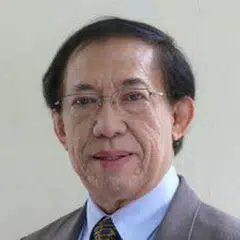Workers' riot in a Chinese nickel company in Indonesia: Could it have been prevented?

A recent conflict between Indonesian workers and Chinese workers in the Gunbuster Nickel Industry (GNI) Smelter Company, located in North Morowali Regency, Central Sulawesi Province, has highlighted several issues concerning Chinese investment in Indonesia.
It started with local workers' demand for a better and safer working environment. The demonstration then became violent and resulted in the burning and looting of part of the factory on 14 January 2023. Two people died, one Chinese worker and one local worker, and many were injured. In fact, this is not the first conflict in the Morowali smelter nickel industry, but to our knowledge, this is the first one where there have been casualties.
This violent industrial conflict drew national attention after being reported widely on social media. While the authorities managed to control the situation, the tension is not yet over. What is at stake is the future of Chinese investments in Indonesia in general and in Sulawesi in particular.
Origins of the conflict
The incident started from the demand of local workers for GNI to improve the safety, working environment and salary of local workers. The local workers were represented by Serikat Pekerja Nasional (National Trade Union or SPN).
On 13 January, the negotiations between the GNI management and the trade union had agreed on most of the workers' demands. Management, however, did not approve the request to restore the dismissed workers because of their involvement in the leadership of SPN. As a result, the SPN urged workers to strike on 14 January.
According to a newspaper report, local workers decided to stage a strike and asked all workers inside the company, including their Chinese counterparts, to join in, but the latter refused. Meanwhile, the SPN reported that one Chinese worker attacked an Indonesian worker using an iron stick, turning what was, heretofore, a peaceful strike into a violent conflict.
...ethnic and cultural differences; poor governance and unequal treatment of Chinese migrant workers vs local workers; and external actors seeking to undermine Jokowi's ambitions regarding the development of the nickel industry.
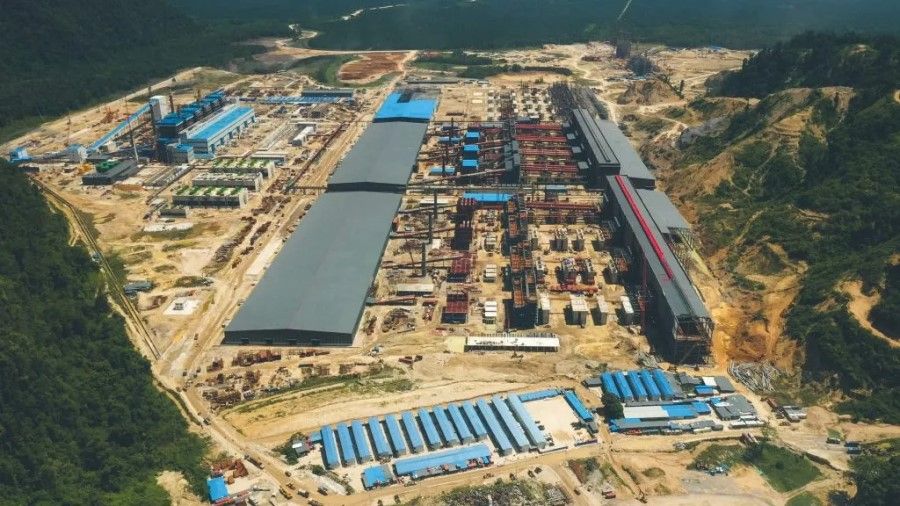
The demonstrators began to burn the company's properties, including heavy machinery, vehicles and other facilities. The police were called in and soon restored order. However, in the evening, some "demonstrators" raided and looted the female workers' hostel inside the company's compound. SPN's leaders denied workers' involvement in the raid as the demonstration had already ended. There is suspicion that the perpetrators were outsiders who wanted to prolong the conflict.
What triggered the workers' strike and developed into violence is still under investigation. There were at least three factors at play in the escalation. These are ethnic and cultural differences; poor governance and unequal treatment of Chinese migrant workers vs local workers; and external actors seeking to undermine Jokowi's ambitions regarding the development of the nickel industry.
The importance of the nickel industry
Indonesia is one of the largest nickel producers in the world. According to data from the United States Geological Survey, nickel production in the country reached around one million metric tonnes in 2021, contributing 37% of world nickel production. Morowali itself contributes about 60% of the total value of the nickel industry in Indonesia.
In the past, nickel was exported as raw materials such as nickel ore, which is an important metal for steel, battery and electric car industries. The Joko "Jokowi" Widodo administration, especially in his second term, began to implement a stringent downstream policy, i.e., requiring mining companies to process mineral ore domestically to increase domestic value add. Indonesia started banning nickel ore export in early 2020, and withdrawing the export permits for mining companies that did not build smelters.
...foreign investments, mainly from China, have increased significantly since 2015. These are concentrated in the nickel processing industry.
Since 2015, Indonesia has invited foreign investors to build nickel smelters to support its downstream policy. While Western investors were reluctant to invest in this "energy-intensive" sector, mainland Chinese investors were eager to enter the industry as they badly needed the semi-processed nickel supply. As a result, most of these nickel smelter companies operating in Indonesia now are from mainland China.
Figure 1 shows that foreign investments, mainly from China, have increased significantly since 2015. These are concentrated in the nickel processing industry. Ferronickel and derivative products, such as iron and steel, are also exported, mainly to China.
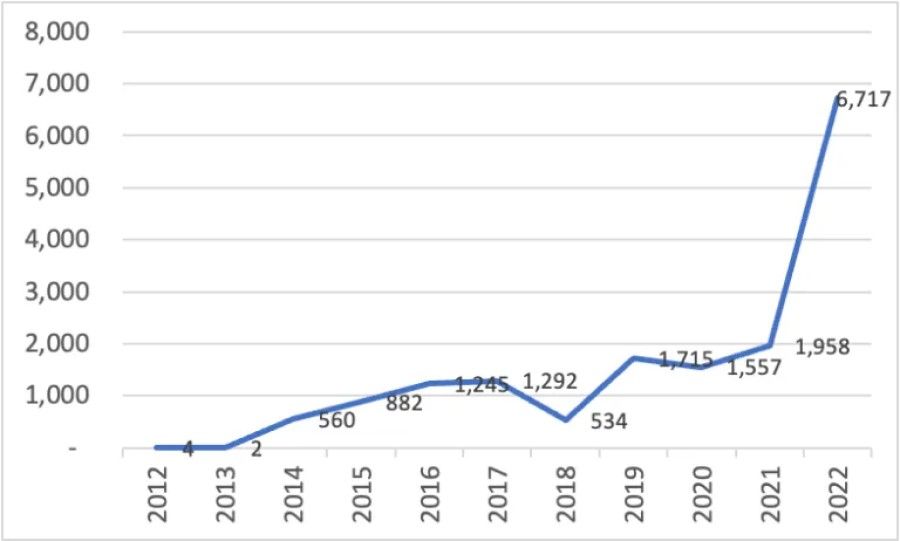
The presence of Chinese nickel companies and skilled Chinese workers has driven the rapid development of the ferronickel smelting industry in Sulawesi. Chinese investments in Morowali have contributed to the local economy, increasing the output (GDP) (Figure 2) and local government tax revenue (Figure 3). These investments have also led to more job opportunities for the locals and indirectly contribute to the local economy, through spillover effects to many small businesses, including mom-and-pop shops, and room rental businesses.
Before having smelters, Indonesia's nickel ore exports only earned around US$1 billion per year, but after having smelters, the gains from the export of nickel-processed products jumped to US$20.9 billion in 2021.
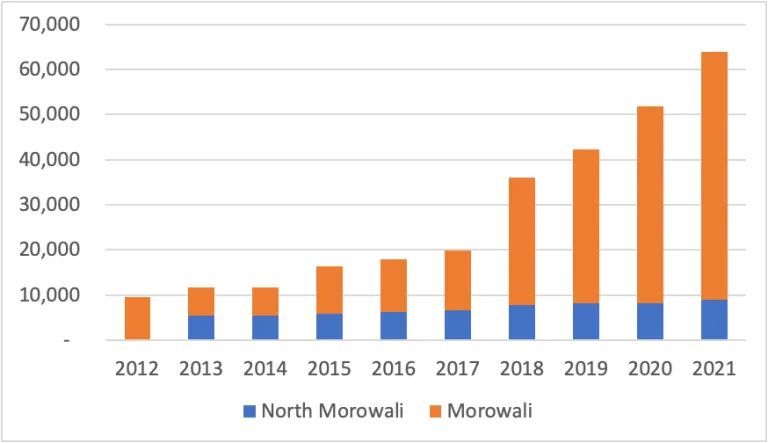
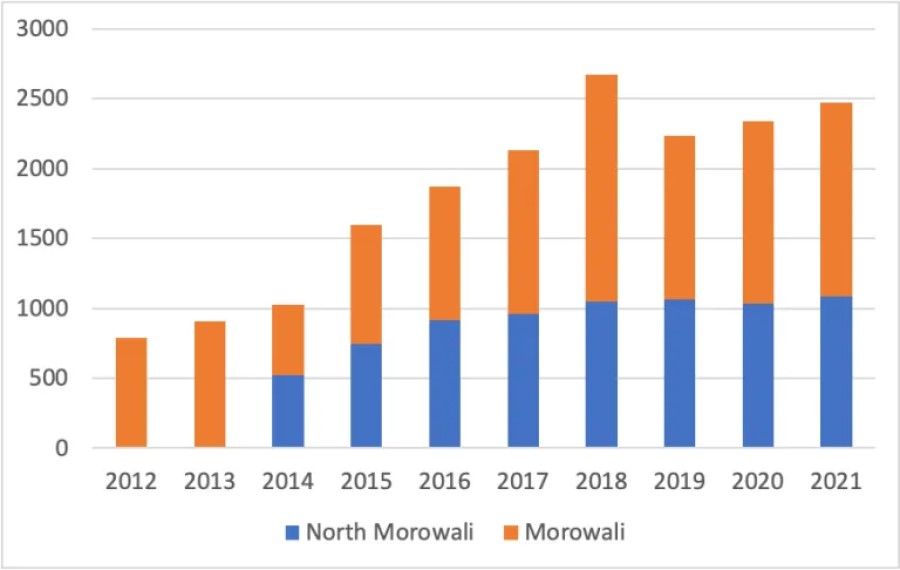
President Jokowi said that Indonesia would continue implementing the downstreaming policy even though Indonesia lost the WTO lawsuit on the export ban. This policy is believed to have successfully increased Indonesia's manufacturing export competitiveness and boosted the state revenue collection from taxes.
Before having smelters, Indonesia's nickel ore exports only earned around US$1 billion per year, but after having smelters, the gains from the export of nickel-processed products jumped to US$20.9 billion in 2021. This is expected to increase to US$30 billion in 2022. In addition, the president believed Indonesia would also gain from technology transfer in the nickel processing industry. His ambition is that Indonesia would become a global hub for nickel-based material production.
Given this ambition, Indonesia is interested in attracting more Chinese investments in the sector. Nevertheless, the violent conflict in Morowali, if not resolved completely, would deter Chinese investors from coming, and adversely affect Jokowi's ambition to build the world's largest nickel industry.
Regardless of the debate, the large number of Chinese workers in Morowali have caused negative sentiment against Chinese investment in Indonesia.
Indonesian elites' divided views
The Indonesian elites are divided in opinion on the presence of Chinese foreign workers. This division is reflected in dialogues between Luhut Pandjaitan, the current coordinating minister of investment and maritime affairs, and Jusuf Kalla (JK). The latter is a former vice-president of Indonesia (2004-2009 and 2014-2019) and used to be one of the leaders of the Golkar Party. He is also a businessman from Sulawesi. His business group is influential in eastern Indonesia, where the Morowali project is located.
In October 2022, JK made a statement that he did not wish to invest in Morowali as the Chinese workers dominated all the projects. He added that in Morowali, even welders were imported from China. JK said he tried to use only Indonesian workers, not Chinese workers. His company, Bukaka, an infrastructure and metal construction industry, only used Indonesian workers, according to him.
Subsequently, in November 2022, Luhut responded to JK's comments on the Chinese workers in Morowali. Luhut said that the nickel industry in Morowali was initially dominated by Chinese workers as there were no skilled workers in the area. This was because Indonesia had no school on smelter technology, and it was impossible to hire all Indonesians to work in smelter-related operations, given it takes time to train the local workers. However, Luhut said that the situation had changed today. "In Morowali, you would discover that most workers are Indonesians."
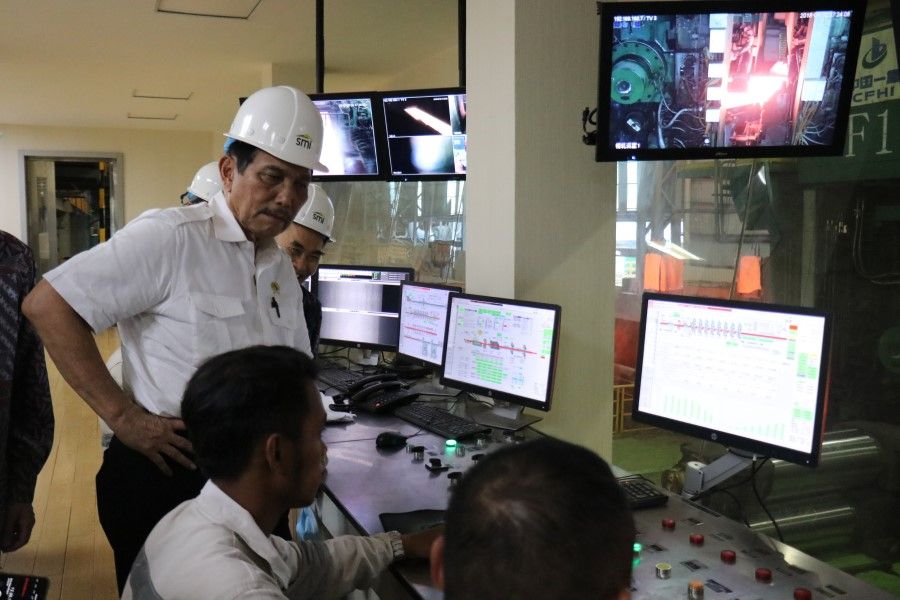
Regardless of the debate, the large number of Chinese workers in Morowali have caused negative sentiment against Chinese investment in Indonesia. According to deputy Manpower Minister, Afriansyah Noor, the government only recorded 547 foreign workers from China in the GNI. Yet, according to the company figure, there were 1,312 workers. He said this discrepancy was due to different ways of classifying workers, and these should therefore be verified by the authorities.
Jokowi critic Shahganda Nainggolan blamed the Joko Widodo government for being too lenient with Chinese companies.
Criticisms and debates
The Indonesian elites have different views concerning Chinese companies in general and the GNI in particular. Former Secretary of State Owned Companies (BUMN) Ministry, Said Didu, was one of the strongest critics of Chinese investment. He said that the government had sold the country to China, and argued that Chinese smelters companies eventually gained most of the profit and brought it back to China while Indonesia gained very little.
Another Jokowi critic, Shahganda Nainggolan, who got a PhD from the University of Indonesia on Indonesian labour history, equates Chinese mining companies to the Dutch VOC (Vereenigde Oostindische Compagnie, Dutch East Indies Company, 1602-1799). He accused Chinese companies of exploiting Indonesia's resources and enslaving Indonesian workers, ignoring workers' rights. He added the Chinese companies ignored the safety and welfare of the local workers and exploited the workers worse than their Western counterparts. He added that the Chinese companies do not feel comfortable with SPN and do not know how to deal with them as there is no trade union in China. They are therefore ignorant of human rights.
Nainggolan blamed the Joko Widodo government for being too lenient with Chinese companies. He argued that there were too many Chinese workers and they did not understand the local language and culture. This has therefore caused cultural conflicts. He compared them with the Japanese, Korean, and American workers who could speak Indonesian or at least understood the language and were willing to learn the local culture.
Kat Saing, the Morowali workers association leader, noted that they were not against Chinese workers. But he did not deny there was friction between local and Chinese workers. Nevertheless, he was critical of the Chinese company management for not being responsive to the workers' demands, especially on safety and welfare issues. They did not observe the regulations on occupational health and safety regulations (Kesehatan dan Keselamatan Kerja or KKK), which stipulated that the company should provide workers with a healthy and safe working environment. He also raised the issues of salary and contracts for being detrimental to the welfare of local workers.
Daeng Wahidin, president of the Indonesian Muslim Workers' Brotherhood, PPMI (Persaudaraan Pekerja Muslim Indonesia), blamed the GNI management for discriminating against "pribumi" workers. He claimed that the local workers who did the same jobs were only paid Rp 5 million (US$334), while their Chinese counterparts were paid more than three times that. Yet, there is no hard evidence for this claim. He blamed Luhut Pandjaitan, who "endorsed" the permit to the Chinese companies in Morowali to "exploit Indonesian workers" and "to sell the country to foreigners".
However, Maman Abdurrahman, the deputy of Committee 7 (Komisi VII) in the Indonesian parliament, offered a more balanced picture. He noted that Indonesia needed foreign investment, including Chinese investments, and argued that not all Chinese companies were like the ones described by the critics. He acknowledged that there were problems between the management and the local workers in the GNI case, but that the problem had to be resolved by both workers and the company; they were two sides of one coin, and had a symbiotic relationship.
Chinese workers could tolerate harsh working conditions and long working hours, which were unacceptable to Indonesian workers. Therefore, Chinese companies should be aware of Indonesian culture...
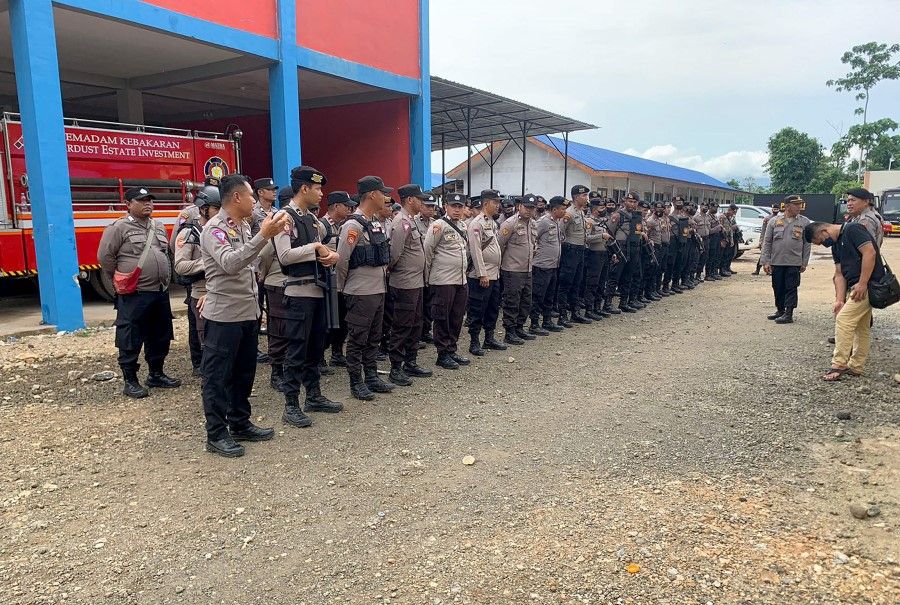
Yet, he also noted a striking difference between Chinese workers and local workers, in terms of working attitudes and social values. Chinese workers could tolerate harsh working conditions and long working hours, which were unacceptable to Indonesian workers. Therefore, Chinese companies should be aware of Indonesian culture, they needed to communicate with the local workers, and this required some knowledge of the basic Indonesian language.
Nevertheless, regarding the poor safety and working conditions of the workers in some Chinese mining companies, Maman argued that these needed to be corrected and the authorities should act immediately. He was also concerned that the demonstration had led to violent conflict, and that the worksite was destroyed. This, he said, should not be tolerated.
The poor safety and working conditions of the workers in the GNI are, in fact, not a secret. On 22 December 2022, two Indonesian workers died in the smelters in work accidents. This incident triggered workers' demands that led to the 14 January conflict. Nevertheless, it should be noted that the GNI is not a good reflection of other smelters in Indonesia. Many companies operate with safer and better working conditions. The government should nevertheless supervise these companies and ensure strict implementation of work-safety regulations.
He [Jusuf Kalla] called for other smelter nickel projects in Sulawesi to be returned to the locals and local authorities.
Deputy Manpower Minister Afriansyah Noor presented the government position. He mentioned that the government had paid attention to foreign companies, including Chinese companies. The big Chinese companies often operate with several sub-companies, and the latter, in some cases, do not do the job properly. The work accident that occurred on 22 December 2022 at the GNI smelter, needed to be investigated and resolved. He urged the local authorities to address the problem seriously before it got worse.
Interestingly, on 30 January, in an entrepreneurs' meeting, JK made a speech mentioning the conflict in North Morowali. He noted that it was important to prevent the recurrence of the conflict, and this could be done with the locals and local authorities taking over the smelter nickel projects in Sulawesi. He went on to say that Indonesians had nothing to be proud of with foreigners managing the smelters. He claimed local entrepreneurs had the capability to operate the business, and supported the plan of the South Sulawesi provincial government and entrepreneurs to take over the Luwu Timur nickel mining project from PT Vale. He called for other smelter nickel projects in Sulawesi to be returned to the locals and local authorities. JK was clearly using the Morowali incident to play up Indonesian nationalism.
...the most immediate issue to tackle is the enforcement of labour regulations, specifically the improvement of worker safety and their work environment, and adjustments of worker salaries.
Much work to be done
Reviewing what has happened in the GNI and beyond, one can see three factors at work in relation to China-managed companies in Indonesia. Firstly, there was a cultural conflict between the local Indonesian workers and the Chinese workers. Language and cultural differences had caused misunderstandings and triggered physical tensions.
Secondly, the conflict could have been avoided or lessened if companies would implement good governance concerning safe working and living conditions for all workers.
Thirdly, there is a clear division of views concerning Chinese investment and Chinese corporate operations among the Indonesian elites. One group is against the presence of Chinese companies and sees Chinese companies as exploiters. But some members of this group may also have their own vested interests as they are also investing in a similar business. The other group welcomes the Chinese companies, as no other country has the capital and willingness to invest in Indonesia on such a scale.
The above factors contributed to the violent conflict in North Morowali, but the most immediate issue to tackle is the enforcement of labour regulations, specifically the improvement of worker safety and their work environment, and adjustments of worker salaries. This improvement would reduce the potential for future industrial conflict, if not eliminate it.
Reducing foreign worker numbers and improving communication between the Chinese and local workers are also needed. Identifying the perpetrators is also an immediate issue to be resolved, not only to protect the industry but also to prevent this issue from being exploited to undermine the government's policy.
This article was first published by ISEAS - Yusof Ishak Institute as ISEAS Perspective 2023/8 "Lessons to Learn from the North Morowali Smelter Riot".
Related: Indonesians welcome Chinese investment but fear influx of new Chinese migrants | Indonesian elites and the general public have different views of China | In Indonesia, Chinese financing for coal-fired power plants grows faster than that for renewables | Indonesia: Why China-funded companies are targeted by the anti-Jokowi camp | Can Chinese capital and technologies jumpstart economic development in Borneo?
